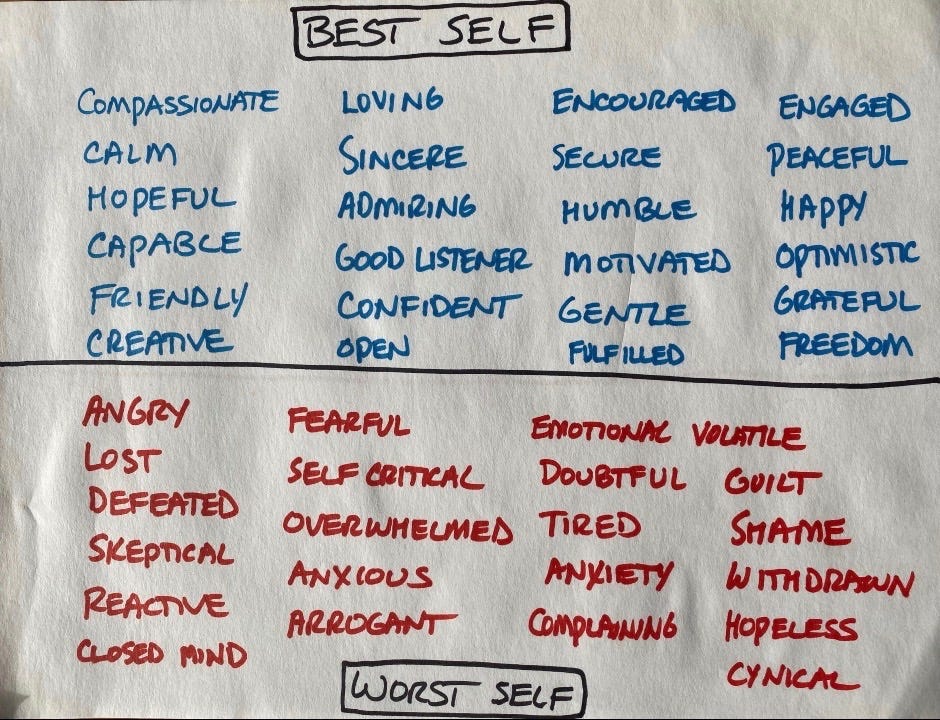Our best selves.
We know it when we have it. We operate at a high level of energy, we are actively engaged with whatever we are doing, we are open to and feel warmth and compassion toward ourselves and others, we feel creative, ideas flow from out of nowhere, and we feel confident that we could turn a curve ball in our lives into a home run.
We all inhabit two worlds — the environment of our minds and the external environment. It is easy to be your best self if you are a monk and meditate in a cave all day or if you are on a beautiful island vacation with someone you love, free from all of It.
But outside the cave or off the island we are assaulted, from the moment we wake up, by our minds and our external environment. As soon as your brain comes online in the morning, often before you even open your eyes, the bullhorn of internal dialogue begins to blare. It commands your attention and it can drag you in chains down dark mental and emotional alleyways, most not of your choosing.
And then, as soon as you crawl out of bed with the bullhorn blaring, your environment comes at you full force — you are late, kids are crying, cars are honking, rude comments made, jam packed email inbox, new problems at work or home, significant other pissed off at you, a pastry in the window that you suddenly must have……
Matt Church, a well known speaker and thought leader from Australia, introduced me to a concept that I have found to be incredibly useful for navigating our internal mental environment and for mitigating the impact of the outside world on it. It is a question that we can ask ourselves at any time, during any day, and especially if we are struggling: am I above the line or am I below the line. For Matt being above the line means being loving and courageous, and below the line means being angry and prideful.
I took the concept of the line a step further by defining being above the line as being in the territory of our best selves, and being below the line as being in the territory of our worst selves.
I meet every two weeks with a group of surgical colleagues. Our group has been together for over two years, and the ability to speak about our lives confidentially to each other has been a powerful addition to all of our lives. This week I introduced them to the idea of being above or below the line and then we brainstormed words that described attributes of being above or below the line. It was a remarkable experience, and one that opened lines of deeper contemplation and reflection for all of us. This is a picture of the results of our brainstorm.

This collection of words certainly gives truth to Sam Harris’ observation that “the quality of your mind determines the quality of your life.” Everyday our conscious awareness is assaulted by our minds and the external environment. And some days one or the other, or both, win out and drag us below the line. Other days we win, and stay above the line. It is easy to get dragged below the line. It is much harder to stay above the line. But like all things worthwhile in life, it is worth the effort.
The central repository for all of the thoughts and emotions and the stimuli from the external environment is our conscious awareness. Most of the time we are in a trance of our thoughts and in our responses to the outside world. The one source of control, our real superpower, is the cultivation of our conscious awareness of it all and in that space exists our only real freedom — choice. The choice to decide if and how we should respond to any aspect of the daily bombardment.
This is our only free will. But only if we are actually aware. Somedays it is easy, other days it is much harder. This is the work of getting above the line, day after day. Like most things, it gets easier over time as it becomes habitual. This is the action point of our individual responsibility for our personal wellbeing.
I decided to commit myself to doing my very best to staying above the line as a foundation for my life. As part of that commitment I do my best everyday 1) to consciously set my intention to stay above the line and 2) to have the discipline to try my best to do so, no matter what. It works. Most days.
Pick a word from the Above the Line and focus on just improving that one thing. Start small, start today, and don’t stop.




0 Comments